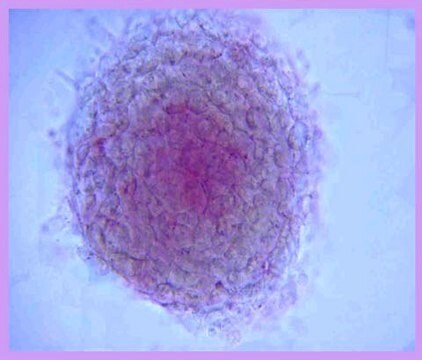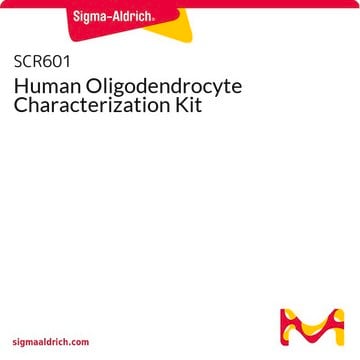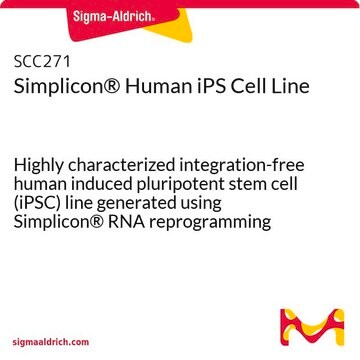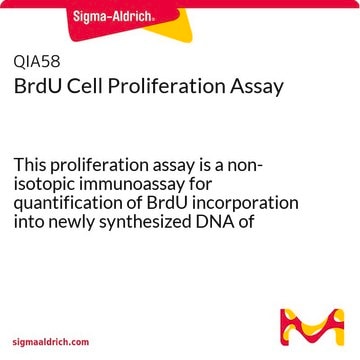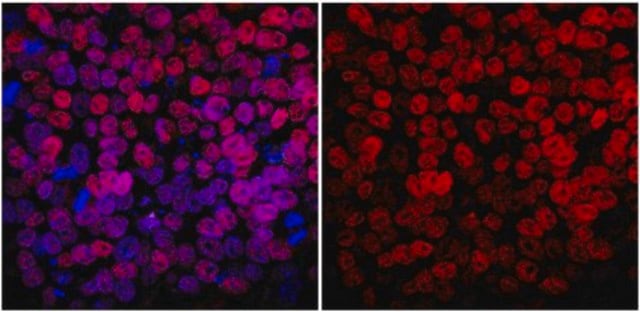SCR078
Fluorescent Human ES/iPS Cell Characterization Kit
This Fluorescent Human ES/iPS Cell Characterization Kit contains a range of sensitive tools for the phenotypic assessment of the pluripotent status of human Embryonic stem & induced pluripotent Stem cells.
Se connecterpour consulter vos tarifs contractuels et ceux de votre entreprise/organisme
About This Item
Code UNSPSC :
12161503
eCl@ss :
32161000
Nomenclature NACRES :
NA.84
Produits recommandés
Description générale
Human embryonic stem (hES) cells are pluripotent cells derived from the inner cell mass of pre-implantation blastocysts. Human induced pluripotent (hiPS) cells are pluripotent cells generated by reprogramming human somatic cells using four transcription factors, Oct-4, Klf-4, Sox-2, and c-Myc, or their variants. Both hESC and hiPSC can self-renew and have the ability to generate all three germ layers: ectoderm, mesoderm, and endoderm. In vitro, hESC/iPSC are normally maintained and propagated on mouse fibroblast feeders for extended periods in media containing basic fibroblast growth factor (bFGF). However, spontaneous differentiation may occur in subpopulations of cells. Several pluripotent markers are commonly used to distinguish pluripotent hESC/iPSC from differentiated cells.
EMD Millipore’s Fluorescent Human ES/iPS Cell Characterization Kit contains a range of sensitive tools for the phenotypic assessment of the pluripotent status of human ES/iPS cells. Included in the kit is an enzymatic assay to measure alkaline phosphatase activity in the cells along with validated directly conjugated antibodies to pluripotent transcription factors, Oct-4, Sox-2 and Nanog and cell surface epitopes TRA-1-60 and TRA-1-81 to enable rapid immunocytochemical marker analysis. The Dapi nuclear dye is conveniently included to aid in cell quantification. While the expression levels of pluripotent markers are expected to be diminished upon differentiation, each possess specific expression kinetics. For example, it has been noted that upon differentiation, Oct-4 and TRA-1-60 expressions are the first to be down-regulated while Nanog and alkaline phosphatase down-regulate at a much slower timeframe.
EMD Millipore’s Fluorescent Human ES/iPS Cell Characterization Kit contains a range of sensitive tools for the phenotypic assessment of the pluripotent status of human ES/iPS cells. Included in the kit is an enzymatic assay to measure alkaline phosphatase activity in the cells along with validated directly conjugated antibodies to pluripotent transcription factors, Oct-4, Sox-2 and Nanog and cell surface epitopes TRA-1-60 and TRA-1-81 to enable rapid immunocytochemical marker analysis. The Dapi nuclear dye is conveniently included to aid in cell quantification. While the expression levels of pluripotent markers are expected to be diminished upon differentiation, each possess specific expression kinetics. For example, it has been noted that upon differentiation, Oct-4 and TRA-1-60 expressions are the first to be down-regulated while Nanog and alkaline phosphatase down-regulate at a much slower timeframe.
Spécificité
Cross Reactivty
None
None
Application
Research Category
Stem Cell Research
Stem Cell Research
Research Sub Category
Pluripotent & Early Differentiation
Pluripotent & Early Differentiation
This Fluorescent Human ES/iPS Cell Characterization Kit contains a range of sensitive tools for the phenotypic assessment of the pluripotent status of human Embryonic stem & induced pluripotent Stem cells.
Composants
1. Fast Red Violet solution (Part No. 90239): One 15 mL bottle.
2. Napthol AS-BI phosphate solution (Part No. 90234). One 15 mL bottle.
3. Mouse anti-Oct-4 (POU5f1), clone 7F9.2, Alexa Fluor™ 488 conjugate (Part No. MAB4419A4-50UL). One vial containing 50 µL of 0.5 mg/mL conjugated monoclonal antibody.
4. Mouse anti-Sox-2, clone 10H9.1, Cy3 conjugate (Part No. MAB4423C3-50UL). One vial containing 50 µL of 0.5 mg/mL conjugated monoclonal antibody.
5. Mouse anti-Nanog, clone 7F7.1, Alexa Fluor 488 conjugate (Part No. MABD24A4-50UL). One vial containing 50 µL of 0.5 mg/mL conjugated monoclonal antibody.
6. Mouse anti-TRA-1-60, clone TRA-1-60, Cy3 conjugate (Part No. MAB4360C3-50UL). One vial containing 50 µL of 0.5 mg/mL conjugated monoclonal antibody.
7. Mouse anti-TRA-1-81, clone TRA-1-81, Cy3 conjugate (Part No. MAB4381C3-50UL). One vial containing 50 µL of 0.5 mg/mL conjugated monoclonal antibody.
8. DAPI, 100 µL (Part No. 90229). One vial containing 100 µL volume.
2. Napthol AS-BI phosphate solution (Part No. 90234). One 15 mL bottle.
3. Mouse anti-Oct-4 (POU5f1), clone 7F9.2, Alexa Fluor™ 488 conjugate (Part No. MAB4419A4-50UL). One vial containing 50 µL of 0.5 mg/mL conjugated monoclonal antibody.
4. Mouse anti-Sox-2, clone 10H9.1, Cy3 conjugate (Part No. MAB4423C3-50UL). One vial containing 50 µL of 0.5 mg/mL conjugated monoclonal antibody.
5. Mouse anti-Nanog, clone 7F7.1, Alexa Fluor 488 conjugate (Part No. MABD24A4-50UL). One vial containing 50 µL of 0.5 mg/mL conjugated monoclonal antibody.
6. Mouse anti-TRA-1-60, clone TRA-1-60, Cy3 conjugate (Part No. MAB4360C3-50UL). One vial containing 50 µL of 0.5 mg/mL conjugated monoclonal antibody.
7. Mouse anti-TRA-1-81, clone TRA-1-81, Cy3 conjugate (Part No. MAB4381C3-50UL). One vial containing 50 µL of 0.5 mg/mL conjugated monoclonal antibody.
8. DAPI, 100 µL (Part No. 90229). One vial containing 100 µL volume.
Qualité
Conjugated antibodies and alkaline phosphatase reagents have been validated on H9 human ES and STEMCCA derived human ips cells.
Forme physique
Purified conjugated mouse monoclonal antibodies are stored in PBS with 0.1% sodium azide and 15mg/ml BSA.
Stockage et stabilité
Store at 2-8°C until expiration date of kit. Do not freeze or expose to elevated temperatures. Discard any remaining reagents after the expiration date.
Informations légales
ALEXA FLUOR is a trademark of Life Technologies
Mention d'avertissement
Warning
Mentions de danger
Conseils de prudence
Classification des risques
Carc. 2 - Eye Irrit. 2 - Skin Irrit. 2
Code de la classe de stockage
10 - Combustible liquids
Certificats d'analyse (COA)
Recherchez un Certificats d'analyse (COA) en saisissant le numéro de lot du produit. Les numéros de lot figurent sur l'étiquette du produit après les mots "Lot" ou "Batch".
Déjà en possession de ce produit ?
Retrouvez la documentation relative aux produits que vous avez récemment achetés dans la Bibliothèque de documents.
Melissa Conti Mazza et al.
Stem cell research, 55, 102506-102506 (2021-08-23)
Mutations in the oncogene PARK7, which codes for DJ-1, have been associated with early-onset autosomal recessive Parkinson's disease (PD); however, the exact role of DJ-1 in PD remains elusive. Fibroblasts from a PD patient with a uniparental disomy, 1 bp deletion
Notre équipe de scientifiques dispose d'une expérience dans tous les secteurs de la recherche, notamment en sciences de la vie, science des matériaux, synthèse chimique, chromatographie, analyse et dans de nombreux autres domaines..
Contacter notre Service technique